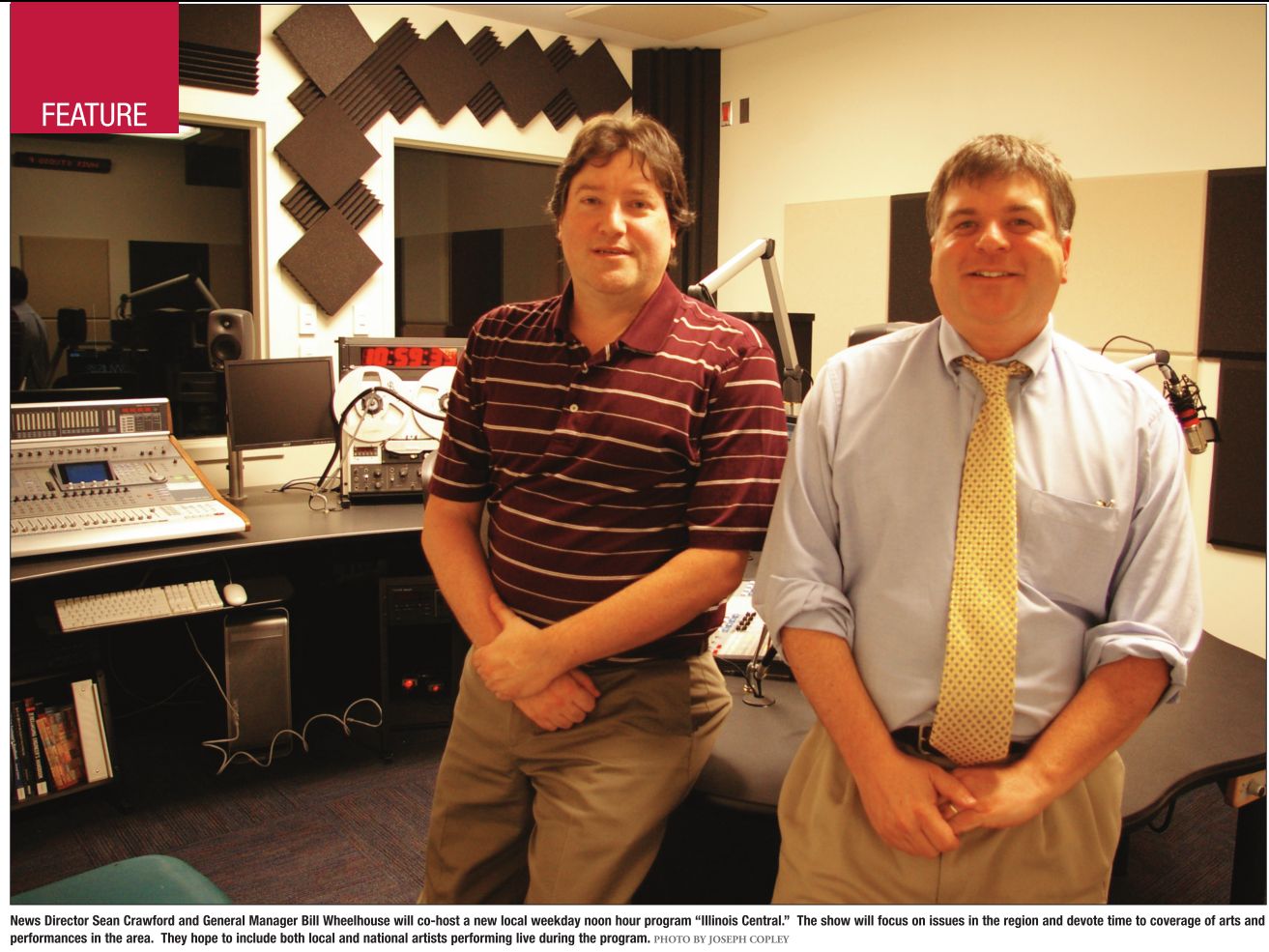
Public radio affiliate switches weekday focus from music to news
MEDIA | Scott Faingold
Change doesn’t have to be painful. At least that’s what WUIS general manager Bill Wheelhouse is hoping will be the case this summer, when the venerable radio station plans to shift from its longtime classical music-based programming to focus instead on news and talk.
“I like to call it ‘civilized talk,’ a public radio version of talk, as opposed to a shoutfest,” says Wheelhouse, quick to point out that Limbaugh-esque ranting will not be on WUIS’s agenda. “‘Informed talk’ would be another way to describe it,” he quips.
The de-emphasis on classical music at the station should come as no surprise, following on the heels of Karl Scroggin’s retirement at the end of March. Since 1984, Scroggin had been hosting “Classics” from 9 a.m. to 1 p.m. Monday through Friday. “In this day and age, it’s not possible to find a replacement for someone like Karl,” Wheelhouse explains. “I’m glad we were able to give him a good sendoff with a lot of respect. We appreciate all those people who have been loyal and we are going to at least try to show them other opportunities to get classical music.”
 To this end, the station is encouraging listeners who have come to rely on Scroggin for their musical needs to tune in to C24, an aptly named digital station featuring 24-hour classical programming and live announcers, which is already streaming online at www.wuis.org. “We recognize classical radio is one of those things that’s slowly going away but we’re still willing to make an effort to get it to people who want it. We’re going to try and help listeners get ahold of HD radios and try to help people one-on-one, if they need it, to set it up.” The station will continue its tradition of recording and later broadcasting concerts by the Illinois Symphony Orchestra.
To this end, the station is encouraging listeners who have come to rely on Scroggin for their musical needs to tune in to C24, an aptly named digital station featuring 24-hour classical programming and live announcers, which is already streaming online at www.wuis.org. “We recognize classical radio is one of those things that’s slowly going away but we’re still willing to make an effort to get it to people who want it. We’re going to try and help listeners get ahold of HD radios and try to help people one-on-one, if they need it, to set it up.” The station will continue its tradition of recording and later broadcasting concerts by the Illinois Symphony Orchestra.
“This is one of those decisions we did not make lightly or off-the-cuff. We really thought about it,” says Wheelhouse. Indeed, the station had been aware of Scroggin’s planned retirement many months in advance of its public announcement and took the opportunity to undertake some serious market research to map out the future of WUIS.
A firm was hired to survey the WUIS audience and later several listener focus groups were assembled to ensure the direction was best for the future of the station. The result of all this research clearly pointed in the direction of the news and talk format, which will also allow the station to do more timely coverage in the event of breaking news at the Capitol during the daytime. These changes will begin at 9 a.m. on the first Monday in July with the WUIS debut of “On Point,” a National Public Radio production from Boston. The show’s host is respected veteran journalist (and Bloomington native) Tom Ashbrook, who spent many years in the field as a foreign correspondent, and began his public radio career as a special correspondent during the aftermath of the Sept. 11 attacks. His show is considered by many to be the cutting edge of radio
journalism. “It’s a twohour talk and call-in show which takes up current
affairs subjects, historical subjects, all good issues,” enthuses
Wheelhouse. “I’ve seen it just cover the gamut. We’re really excited
about it. It’s kind of a newer, upand-coming show and we’ll be airing it
live, which not a lot of stations do.”
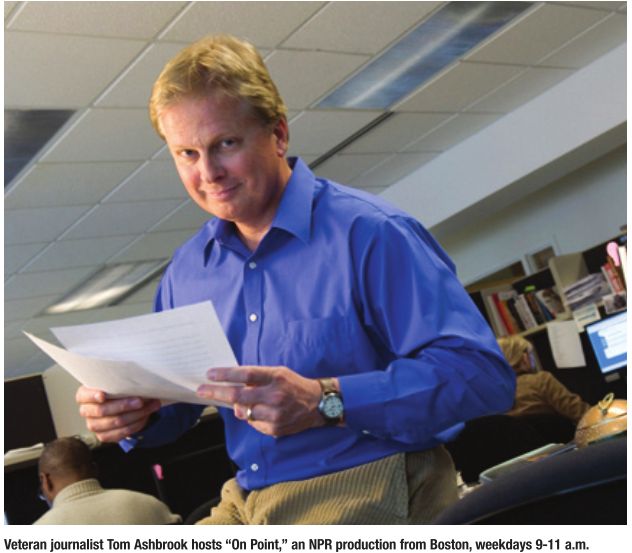
Immediately
following “On Point,” from 11 a.m. to noon, the hour-long “Here and
Now,” hosted by award-winning reporter Robin Young, will bring listeners
up to date on breaking news from the preceding hours.
But the jewel in the crown of the new weekday lineup is arguably “Talk of the Nation.”
The
show, which will air from 1 p.m. to 3 p.m., was the most requested
program in both the station’s recent market research and in polls of
WUIS listeners taken several years ago. The hugely popular talk and news
program, hosted by Neal Conan every Monday through Thursday, covers
subjects “from breaking news and education to religion and the arts,”
according to its website. It ends each week with “Talk of the Nation
Science Friday,” which finds host Ira Flatow focusing specifically on
scientific and technological issues.
Even
with all the prestigious national programming on its way in, the
station is even more excited about some new locally produced content.
“We have decided that we’re going to start a daily 60-minute show in the
noon hour called “Illinois Central,” which Sean Crawford and I are
tentatively set to co-host,” explains Wheelhouse. “The first half hour
will be focused on local news, and the second part will be dedicated to
local arts. Say a classical music performer or a local jazz group is
performing that week, or a new play is going up, we can bring those
people in for interviews, and even have them perform live in our studio.
The show will allow us to have a little longer conversation on arts
subjects because Springfield really is a good town for the arts. There’s
a lot of stuff going, and during ‘Morning Edition’ we have to limit
somebody to maybe three minutes. But here we’ll be able to go longer and
let them stretch out.” In addition, Garrison Keillor’s “Writer’s
Almanac” and “Marketplace Tech Report” will be incorpo rated into “Illinois Central.”
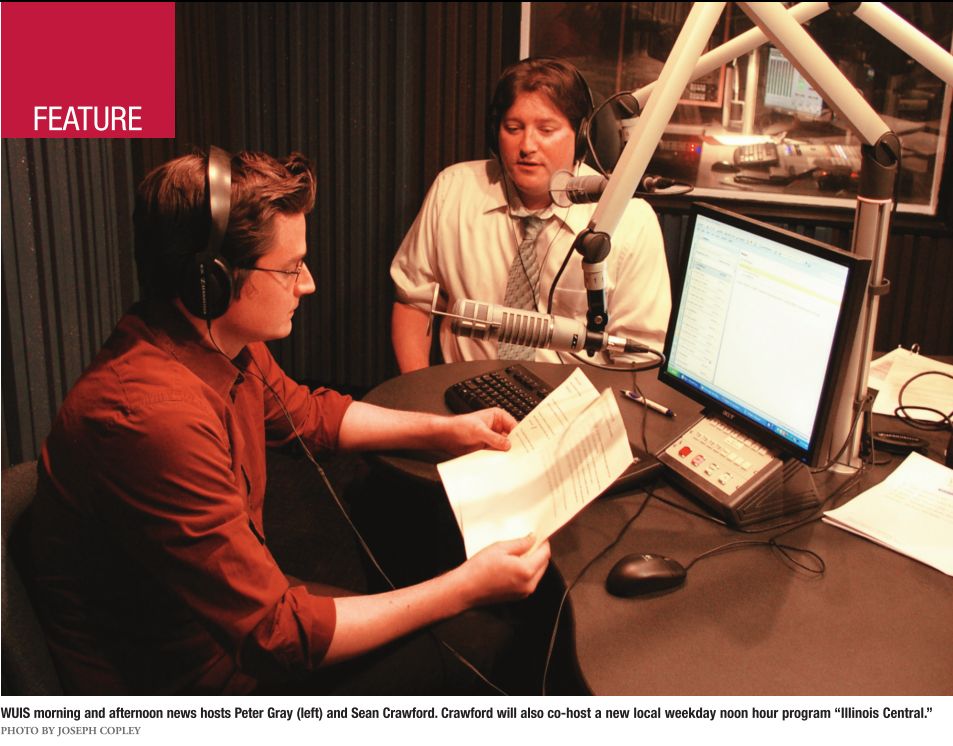
The decision to produce a
daily local show demonstrates that WUIS is not entirely beholden to the
number crunchers when making programming decisions. “We were actually
advised that a local show might not be the best idea,” says
Wheelhouse. “But we really felt a need to bring in some local content.
We are local and the arts are important to our listeners, and this will
give us a chance to reach out to community arts groups, Youth Symphony
and things like that. We’ve exposed some of the local arts scene in the
past and the plan is to do even more in the future.”
On
Fridays, the show will be trimmed to 30 minutes to make room for an
additional broadcast of the long-running, locally produced “State Week
in Review” at 12:30. “The researchers did remark that ‘State Week in
Review’ is one of the more popular locally produced shows they have
encountered at any station,” Wheelhouse points out with justifiable pride. “We were pretty gratified by that.
The show has been on the air for 35 years.”
Weekday evenings will also
offer two additional syndicated shows. The internationally-flavored news
magazine “The World” is a popular co-production between the BBC World
Service, Public Radio International and WGBH/Boston and will be filling
the 7 p.m. to 8 p.m. slot Monday through Friday. It will be followed by
“Q,” an acclaimed – and rather hip – Canadian Broadcasting
Company-produced arts and culture roundup hosted by Jian Ghomeshi, which
is set to air from 8 p.m. to 9 p.m.
While major transformations are clearly in the works for weekdays, the station’s weekend schedule will remain largely unchanged.
“Weekend
Edition” will start at the same time on Saturdays and Sundays, with Ira
Glass’s “This American Life” moving to air immediately following the
popular “Wait, Wait. . .Don’t Tell Me” panel game show on Saturday
mornings. Harry Shearer’s “Le Show”
is departing entirely, but nearly everything else will remain as it has
been, from the folksy variety of “Prairie Home Companion” to the
off-the-cuff rock and roll musings of “Sound Opinions.”
These
days, it is nearly impossible to hear the words “public radio” without
being reminded of the recent congressional controversies over funding,
replete with mantra-like right-wing accusations of “liberal elite” bias.
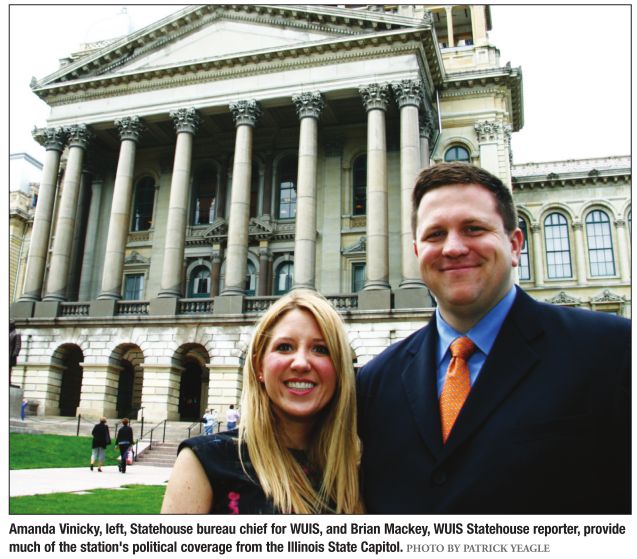
“That stuff hasn’t had much of an effect, on us in terms of listener support,” says Wheelhouse. “What is frustrating
is that I see what we do as nonpartisan, yet support for our funding is
built up along partisan lines. I know a lot of people, affiliated with
both parties, who support our station personally with their own money
and who also support the idea that a very tiny part of the federal
budget be allocated to public broadcasting. But we can’t live in fear,
we’ve got to move forward. It certainly brings the need for listener and
local business support into greater focus.”
Of
course, listener support is one of the things that gives public radio
its identity and appeal, and it is estimated that approximately 30,000
individuals per week tune in to WUIS. “Our listeners do have that extra
affinity,” Wheelhouse says. “They’re part of it and they help contribute
and they do feel some ownership. There’s a loyalty factor there that
sometimes doesn’t exist elsewhere. We operate on a tight budget with a
very small staff.” The station’s annual cash budget is in the
neighborhood of $1.3 million. UIS provides the station with $235,000 of
that, along with inkind support including free rental space, janitorial
and administrative services. Listener donations, in combination with
contributions from local businesses, account for approximately one-third
of the total WUIS budget.
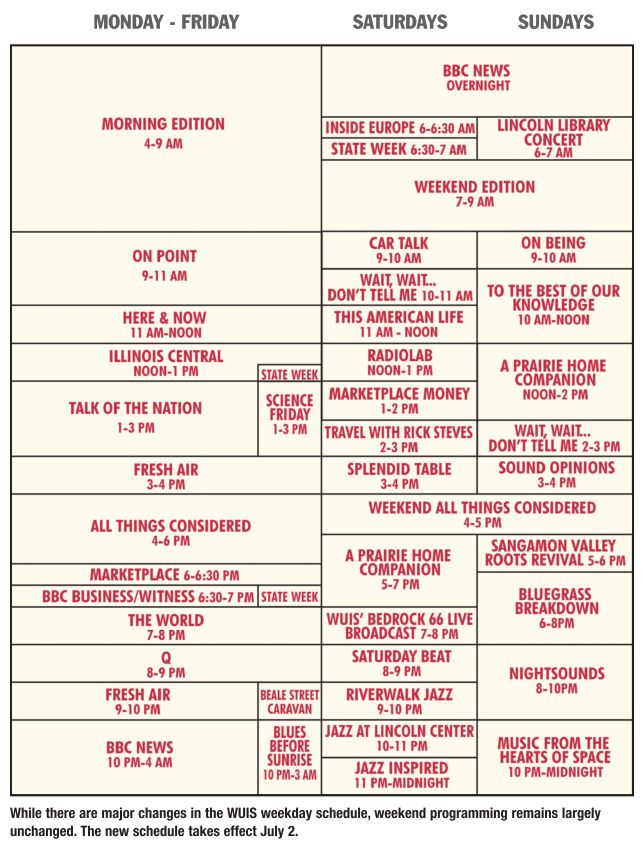
“In
larger cities, public radio has already shifted to being a news and
information source,” says Wheelhouse. “Overall there’s been a decline in
the quality of television news and other mainstream broadcast
journalism in recent years, and print reporting is obviously facing its
own challenges. We feel it’s a good time for us to be another source for
journalism, and we certainly think that these programming changes are
going to help central Illinois become more informed and have access to
good quality radio. And we really believe that it will be better for the
long term sustainability of the station.
“We look at it as a positive change and we hope the majority of the listeners will agree.”
Scott Faingold is a regular contributor to IT. He can be reached at [email protected].